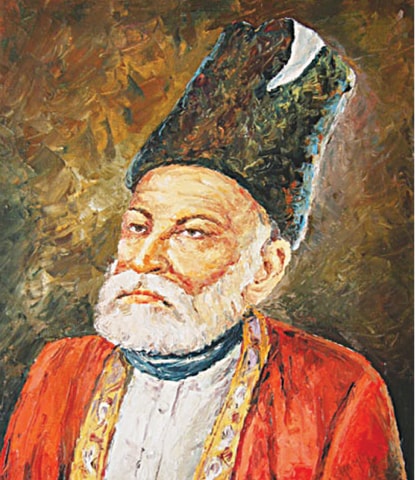
KARACHI: Mirza Asadullah Khan Ghalib, who was born on Dec 27, 1797 in Agra, is widely regarded as the greatest Urdu language poet. Urdu is Pakistan’s national language and there are at least half a dozen cultural organisations in Karachi, a couple of them named after Ghalib, that harp on the importance of the Urdu language. But for some strange reason Ghalib’s birth and death anniversaries are never observed or special events are held, leave alone observed the way they merit, by these organisations. The same negligent attitude was witnessed on the poet’s 119th birthday on Tuesday, which went by completely unnoticed.
Talking to Dawn Ghalib Library’s secretary Rauf Parekh thinks that’s not the case; “We do hold special events and we intend to do one on Feb 15, 2017. Since we are a trust, lack of funds caused us to halt our activities in the past, but rest assured we have been doing our bit. We publish 30 to 35 books on Ghalib and he is very much alive with us. This year our grant has been increased, so you will see more programmes. That being said, I concede that we have not done enough.”
President of the Arts Council of Pakistan Karachi Ahmed Shah says: “Every year at our international Urdu conference we have a session on Ghalib. Even this year we had a lecture by Dr Nomanul Haq on ‘Ghalib Se Iqbal’. Yes, I agree that his birth and death anniversaries should be commemorated. To be honest, we were busy with our post-election stuff, so [we] could not think about it. Also, cultural organisations are not that connected to Urdu literature the way they should be. On Feb 15, which is Ghalib’s death anniversary, we will arrange a conference on his life and work.”
The question remains: where does Ghalib feature on our priority list?
Honorary secretary of Anjuman Taraqqi-i-Urdu Dr Fatima Hassan replies: “The provincial government had announced a holiday on Tuesday, so our employees did not come. Secondly, ours is a ‘research organisation’, our priority is that if a scholar from abroad is in town, we will invite him or her to speak on the subject that s/he specialises in. I agree, though, that asatizah (masters) should be honoured. We try and do our best, for instance, we arranged an event of Hali and Shibli’s centenaries.”
Prof Sahar Ansari is of the view that Ghalib is never ignored: “Birthdays should be celebrated but usually it’s on death anniversaries that poets are discussed. Urdu literary magazines publish special editions on Ghalib, for example Qaumi Zaban and Mah-i-Nau always come out with Ghalib numbers on Feb 15. However, as I said, now the trend is that such commemorations take place on death anniversaries.”
Poet Iftikhar Arif, who heads the Pakistan Academy of Letters, argues: “In the West, birthdays of Milton, Shakespeare and Homer are not celebrated. It is our Eastern tradition that we celebrate the birthdays of our great writers and thinkers. I was recently in Iran where I saw that Firdausi, Saadi, Hafiz, Rumi and Attar’s birth anniversaries were celebrated with fervour. To remember someone is giving proof of your own existence. It suggests the kind of relation you have with that person. If you don’t remember someone, it suggests you have no connection with him. We remember those whom we love. Yet, we don’t celebrate Ghalib, Mir, Anees and Nazeer. Every university in the country has an Urdu department. It does not take much to hold a seminar on a poet. I’ve been watching television and no channel has aired any programme on Ghalib. Literature is not our priority anymore, leave alone remembering Ghalib.”
Published in Dawn December 28th, 2016













































